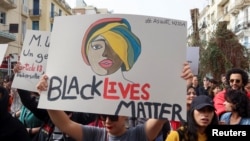"We need evacuation. Tunisia is not safe. No one has a future here when you have this color. It is a crime to have this color," said Josephus Thomas, pointing to the skin on his forearm.
In announcing the crackdown on Feb. 21, President Kais Saied said illegal immigration was a criminal conspiracy to change Tunisia's demography, language the African Union described as "racialized hate speech".
U.S. Assistant Secretary of State Barbara Leaf told Reuters Thursday that Saied's comments had unleashed "attacks and a tidal wave of racist rhetoric," with rights groups saying hundreds of migrants reported being attacked or insulted.
Saied and Tunisia's foreign minister have rejected accusations that he or the government are racist and they announced steps to ease visa regulations for Africans and reminded police of anti-racism laws.
While the official crackdown appeared to end weeks ago, migrants say they still face abuse.
"People told me 'since you are in our country after the president's speech, don't you have any dignity?' I kept silent and they told me I am dirt," said Awadhya Hasan Amine, a Sudanese refugee outside the UNHCR headquarters in Tunis.
Amine has lived in Tunis for five years after fleeing Sudan and then Libya with her husband. Now 30, she has been living on the street outside the UNHCR headquarters since local people pelted her house in the capital's Rouad district with rocks.
"We want to live in a place of safety, stability and peace. We don't want problems in Tunisia," she said.
